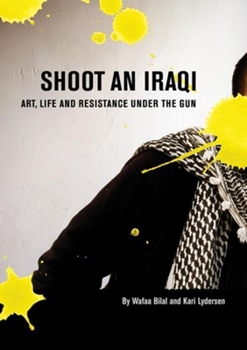Shoot an Iraqi: Art, Life and Resistance Under the Gun
Select Format
Select Condition 
Book Overview
Wafaa Bilal's childhood in Iraq was defined by the horrific rule of Saddam Hussein, two wars, a bloody uprising and time spent interned in chaotic refugee camps in Kuwait and Saudi Arabia. Bilal eventually made it to the United States to become a professor and a successful artist, but when his brother was killed by an unmanned U.S. Predator drone, he decided to use his art to confront those in the comfort zone with the realities of life in a conflict...
Format:Paperback
Language:English
ISBN:087286491X
ISBN13:9780872864917
Release Date:September 2008
Publisher:City Lights Books
Length:240 Pages
Weight:0.74 lbs.
Dimensions:0.6" x 5.9" x 8.4"
Customer Reviews
4 ratings
Both Iraqis and Americans are victims and pawns in power plays beyond their control
Published by Thriftbooks.com User , 14 years ago
"Shoot an Iraqi" is on the ROROTOKO list of cutting-edge intellectual nonfiction. Wafaa Bilal's book interview ran here as the cover feature on December 25, 2009.
Who in their right mind would allow random internet users to decide whether they would be shot?
Published by Thriftbooks.com User , 15 years ago
Who in their right mind would allow random internet users to decide whether they would be shot? "Shoot an Iraqi: Art, Life, and the Resistance Under the Gun" tells the story of Wafaa Bilal. When his brother was killed by an unmanned military device during the Iraq war, Bilal took it locked himself in a room, a camera showing him to the world with a remote controlled paintball gun connected to the internet, in the name of art and political statement. Bilal explains himself quite well, making "Shoot an Iraqi" fascinating reading.
Highly Recommended
Published by Thriftbooks.com User , 15 years ago
From a vantage point different from that of the previous reviewer, I'd like to add that I found the book to be a beautiful, moving story. It weaved between the author's tumultuous childhood in Iraq, and the recent past, documenting an interactive art piece in Chicago which gathered nation-wide attention. As a non-artist, I appreciated having a better understanding of what experiences influenced Bilal to move forward with his "Domestic Tension" piece, and it made me a much more sympathetic voyeur (I had known about Domestic Tension while the website was live.) So much of what we hear on the news about Iraq is de-personified, but when you read an account this intimate, you begin to think twice. Very eye-opening, well written, didn't want to put it down and read it straight through. I hope you enjoy it as much as I did.
If you KNEW you knew you could get away with it, would you shoot a caged Arab?
Published by Thriftbooks.com User , 15 years ago
In May 2007, a man from Iraq lived continuously in a small room in Chicago. He had connected a paintball gun to the Internet so that anyone, anywhere in the world, could take potshots at him. (The gun made an ominous ratcheting sound as it swiveled to follow Wafaa Bilal's movements -- and paintballs, when fired at close range, can penetrate cardboard.) People from 136 countries fired at Bilal, that cowering fellow in the protective goggles over in the corner. In fact, in just one month, they fired at him 65,000 times (or about once every 40 seconds). Soon nearly every surface of the room was splattered with viscous, smelly, yellow paintball gunk. Geeks hacked in to turn the paintball "marker" into a rapid-fire machine gun. (They were anonymous; for them, it was like playing an online game.) Other geeks intervened, left-clicking frantically to avert the gun from Bilal. The sadists and caregivers of the virtual world were at war. But why would anyone subject himself to continual "gunfire"? You might do it if you had lived in a totalitarian state -- the spies in the universities, the snitches in the street, paranoia like something chafing against your skin -- and if you had PTSD from living through Saddam's wars, and if you had endured the filth and famine of refugee camps just to escape your own homeland. You might do it because what remains of your family is still living in that "man-made disaster," a war zone -- and because, out of sympathy, you wanted to put yourself through the same hell that they're living in. Bilal's other performance-art pieces -- a suicide bombing scene satirically recreated, getting himself waterboarded -- suggest that he craves publicity both for himself and for the miseries of Iraq. But as good as all the shooting-gallery suspense is, the best parts of Bilal's account are his flashbacks to life in Iraq -- poverty, competitive studies, depression, religious zealots, Saddam's propaganda everywhere. Meanwhile, back here in the States, it's 3 am. Drowsily, you surf over to grainy video of a man in a keffiyeh, his eyes wide and darting behind those thick goggles. Do you intervene, or just watch? Or do you shoot?




